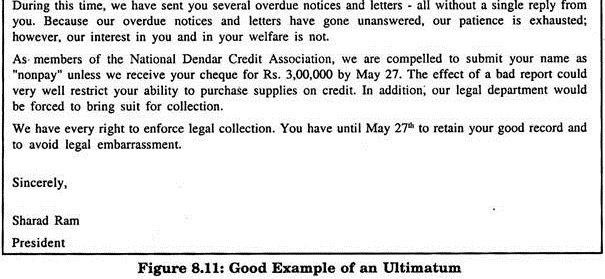The strong-appeal letter emphasizes urgency. It says, in effect, “We must have the payment by return mail.” By developing the basic appeals and insisting on payment for the debtor’s own good, the writer adds stringency.
Comments about the cost of a lawsuit are common in urgency letters. Although the loss of credit or possessions may be implied, the best psychology is to let the reader know you are still willing to settle things without undue embarrassment.
The deftness with which the writer handles the collection problem at this stage determines which customers are retained for the company. At the same time, the account has reached a crucial stage at which the assumption is that the customer will pay only after considerable pressure is applied.
To develop the strong appeal from the mild appeal, follow these suggestions:
ADVERTISEMENTS:
1. Change the appeal from one of challenging the debtor’s retention of a favorable credit rating, a good reputation, or a prized possession to one of definitely implying that a debtor is about to lose something of value or face a distasteful situation.
2. Decrease the persuasive tone. Become more demanding.
3. Instead of discussing why the debtor doesn’t pay, talk about why the debtor must pay.
4. Offer the debtor a choice between two or more things (partial payment, time notes), none of which enables the debtor to get off the hook.
ADVERTISEMENTS:
5. Let the debtor know that the weight of evidence and the legal aspects definitely favor you and not the debtor.
6. Consider using the deductive approach.
Late in the collection series, nothing (including the inductive approach) has worked. At this stage a deductive letter might “shake” the debtor and achieve the desired result. If the letter shocks a debtor into payment well. If it doesn’t, little is lost by trying the deductive approach.
Ultimatum:
ADVERTISEMENTS:
When strong appeals fail to do their work, the collection writer must take the only remaining course of action: a letter that says, “you must pay now of your own volition or we will use every possible legal means to enforce collection”.
In this letter you must mention whatever action you plan to take to obtain final collection. But be careful that your letter does not use language that makes you susceptible to legal action! Do not start name-calling. And avoid preaching because debtors who get to this stage do not react favorably to advice about how they should have acted.
The ultimatum letter in Figure 8.11 shows that the tone has changed from “must pay” to “pay now or else”. Note that the ultimatum reviews the sequence of events, past and future, to indicate the seriousness of the matter. At this late stage, deductive writing is an option. To emphasize the ultimatum, the letter could have used the third paragraph as the beginning paragraph.
If the ultimatum letter does not result in collection, the only recourse is to tell the debtor you are taking the steps promised.

